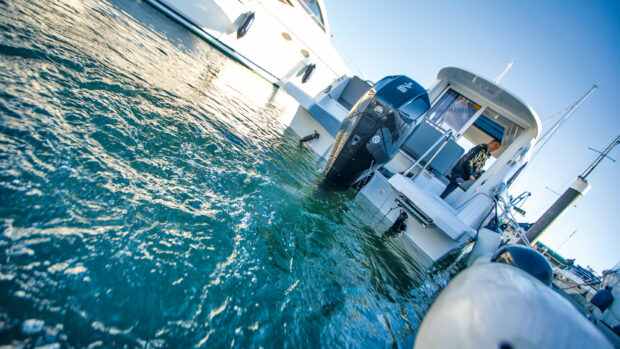In light of recent price hikes for leisure boat insurance policies, Alex Smith interviews five leading insurance providers to find out why it’s happening.
What differentiates boat insurance from other forms of insurance?
According to our interviewees, boat insurance is different to home or car insurance in several key ways. Its policies are usually more tailored and individual; they are often based on agreed values rather than market values; and they tend to involve face-to-face client relationships rather than automated online aggregators. But the most critical difference is that a boat is a relatively expensive and highly mobile asset with a very dynamic risk profile.
Jeremy Entwistle from GJW Direct explains: “A house, though valuable, is a static entity; and a car has the benefit of user-friendly road networks and signage to help moderate risk. But whether in harbour or at sea, a boat brings with it the potential for big losses from a wide range of risks, including fire, theft, groundings, sinkage, break-in, collision, poor maintenance, extreme weather events and machinery breakdown. It’s very different and, in some cases, more difficult to write the risk on.”
But are the underlying principles the same?
Yes, the calculations and processes are much the same. “An underwriter assesses the risk and applies a rate to that risk against the sum insured,” says Steve Risk from Coleman Marine. “That results in the premium. The premium is the income the insurer will take, minus any that the broker might be earning, and the insurer then applies the premium against any claim activity.
“If there is a premium of £2,000 and a claim of £10,000, the insurer is facing a deficit, so the fundamentals of the marine market are similar to any other insurance.”
What percentage of the boat insurance premium goes out again in claims?
It varies from one category to another but in recent years, and most notably between 2008 and 2018, far more has been paid out in boat insurance claims than has been taken in premiums. It was a period during which insurance companies clamoured for business, driving premium prices down and implicitly encouraging the customer to buy boat insurance on the basis of price.
That generated a problematic business model, as Richard Power from Fastnet Marine Insurance explains: “It got to a stage when it was clear that those rates were unsustainable. In fact, during the three years to the end of 2017 in the Lloyds yacht insurance sector (which is a pretty good benchmark for the sector as a whole), claims exceeded premiums by between 180 and 300%.”
Is that why boat insurance premiums have risen faster than inflation?
Yes. In the last two years, boat insurance premiums have risen sharply. While the extent varies with size and category of boat, most insurers agree that the general scale of the increases is somewhere between 25% and 60%. Larger boats have seen the highest increases but there have been increases across the sector that leisure boaters have baulked at.
Article continues below…

Moving your boat by road: Everything you need to know

Crossing the English Channel by boat: Everything you need to know
Jeremy Entwistle from GJW Direct notes that customers will also have been hit by the Government doubling Insurance Premium Tax over the last couple of years. That said, boat insurers are still battling for market share and there are plenty of ongoing customer initiatives. To add to this, over the last couple of years online quoting has improved and customers can quickly get boat insurance quotes themselves rather than waiting a couple of days.
We’re a long way from price comparison websites dominating the boat insurance market like they do in motor insurance, but this transition puts power in the hands of customers to shop around, check their cover and get a policy that is priced for what they really need. Always remember that boat insurers don’t necessarily share the same view of risk!
Why have the price increases happened?
The increased premiums of the last couple of years are a direct result of an industry attempting to rebalance the books after a period of unsustainable pricing. Simon Tonks from Pantaenius explains: “The industry has struggled for profitability over the years, with competition driving the price down, at the same time as attritional claims and larger losses were affecting the market. Despite these things, premiums really didn’t increase for a long time so the market is just now catching up with that.”

On board fires are one of many possible risks…
What caused under-pricing in the past?
Prior to the financial crisis of 2007-2008, boat insurance companies would generally gather data to identify the ‘burning cost’ – the actual cost of claims on an annual basis – in relation to a given yachting sector. That would then be factored into the calculations in order to determine a premium rating model that could accommodate the burning cost while providing sustainable returns for investors.
After the crisis, with a flat stock market, “a lot of people stepped into yacht insurance, providing policies of varying degrees of coverage, quality and security,” says Richard Power. “And that drove down the rates that are used to calculate premiums at the same time as the values to which they are applied were reducing, so you had a double whammy of premiums dropping through the floor.”
Richard believes that the ‘burning cost’ model was “pretty much thrown out the window in the second half of the 2000s and most insurers just started writing the business for income.” That incurred a much higher risk than would ideally be taken on with a proper rating model and it inevitably incurred huge claims and big losses when damaging weather events struck.

…extreme weather events are another
Why are boat insurance price increases happening now?
Given the disparity between income and payouts, the boat insurance increases have become increasingly inevitable – but the timing of them has been conditioned by various other factors. Hurricane Irma in 2018, a succession of storms in European waters and a flurry of Mediterranean yacht fires seem to have been critical. The UK’s inland waterways have also experienced flooding; and the loss of various providers from the boat insurance market has also been a factor.
Are the boat insurance increases justified?
The consensus would suggest that they are. Barrie Sullivan from Y Yacht Insurance said: “These recent increases aren’t merely justified; they’re essential. Quite a lot of insurers have moved out of the market because they’ve made no money and most of the insurance companies and underwriters are owned elsewhere. The owners of these big corporations are in it to make money, not to subsidise. If they’re subsidising any part of their emporium, they will simply shut it down.”
Have we been paying too little for too long?
It certainly looks that way. Given the increasing scale, value and complexity of yachts, the proliferation of big loss weather events and yacht fires, and the higher rate of boat insurance claims, it seems we have been paying too little. Jeremy Entwistle said: “At one point, we sat there and watched what was almost a race to the bottom. We watched people slashing prices and we had to sit there and take the pain. Now a sense of balance has been restored.”

“The market has transformed from a buyer’s to a seller’s market” – Richard Power, Fastnet Marine Insurance
Are we paying for the industry’s mistakes?
In terms of current boat insurance premium increases, it’s fair to say that we’re now paying the price required to bring about a new and more sustainable equilibrium for marine insurers – and that’s a consequence of a short-term, price-driven approach to securing new business in which boat insurance companies were all, to a degree, complicit.
Are we paying for other boaters’ mistakes?
In terms of a claim-free boat owner helping settle the bill for the accident of another through increased boat insurance premiums, the answer to this is not clear cut. Yes, there is an overall pot, which seeks to retain a positive balance between premiums and claims.
But on the other hand, boat insurers all seek to mitigate the risk and to spread the cost by means of investment and re-insurance, as Jeremy Entwistle points out: “The insurance pot isn’t really just one pot, because we spread that around through re-insurance. So a superyacht claim wouldn’t all come from the same fund. You would dip into several in a situation like that to ensure that the owner of a 20-foot runabout isn’t taking the pain for a superyacht that’s worth a thousand times as much.”
Are boat insurance increases a result of freak weather and climate change?
Four of the five interviewed insurers agreed that climate change has become significant in terms of the timings, frequency and geographical spread of damaging weather events. Jeremy Entwistle said: “What used to be the ten-year storm and the 50-year storm are now two and five year events. They’re far more regular. We’ve seen a lot more hurricanes and named storms in recent years and they inevitably have a big impact.”

Boats face a much wider range of risks than houses
What is the likely impact of coronavirus on boat insurance?
For owners in most countries, the simple reality that they haven’t been able to use their boats for a while is bad news. But in the absence of specific cover built into a contract to cover marina fees or lack of use during enforced down time, it’s a hit the boater will be compelled to take.
What is more critical, however, are the potential implications for yacht owners in the Caribbean, as Barrie Sullivan points out: “In the Caribbean, most clients have been told where they can and can’t be during the hurricane season. And because travel is now restricted and a lot of the countries where there is safety and shelter are not accepting any more people, there will be a lot of boaters in the Caribbean who are stuck with their yachts in areas where they won’t get hurricane cover.
“And this is an incredibly sad dilemma because there’s no real solution to it. My view is that, having learnt their lessons through expensive mistakes in the past, no insurers are going to break their rules to accommodate it.”
Will we face further boat insurance rises next year?
While there is some suggestion that some boat insurance companies may add an additional security buffer to their premiums, the consensus suggests that any further increases in the next two years are likely to be inflationary.
Richard Power explains: “Insurers are getting back to where they intended to be. They’re still under pressure from their backing investors to deliver a return but in the UK market, as long as named storms don’t cause too many claims, then certain types of boats will have seen the peak and can now expect to see a flattening off.”
Are boat insurance policies all the same?
Yes and no. Most boat insurance policies from established marine providers are All Risk (rather than Named Peril) policies with Third Party (rather than Hull) cover, because it’s difficult now to park your boat without liability protection. But where boat insurance policies differ the most is in the exclusions – in other words, in what is not covered or in what can only be covered at extra cost.
What are the key boat insurance clauses to look out for?
While clauses covering cruising regions, machinery, personal effects and leaving a boat at anchor should always be carefully scrutinised, another area to be aware of is who is entitled to operate the boat. Most UK policies allow anyone qualified to operate the boat with the owner’s permission, as long as they are not paying for it and are not therefore chartering the boat.
Maintenance is also key because, as Richard Power points out, there are responsibilities on both sides of a boat insurance contract: “The insurer has a responsibility to settle all bonafide claims in a timely manner. And the owner has a responsibility to maintain the boat that’s being insured in a seaworthy manner. And there’s now a lot more scrutiny in claims where the root cause is a lack of maintenance.”
Jeremy Entwistle is in full agreement; “One of the biggest things to be aware of on older boats is wear and tear and corrosion. That’s where the grey areas tend to appear. There’s a fine line between a policy that’s picking up the bill after an accident and a maintenance contract that’s picking up the bill for something that should have been replaced or repaired before it failed.”
Are some boat insurance providers better at paying out than others?
In the wake of big losses, a great many companies have dropped out of the market, which means that in general, the boat insurance companies that remain take a transparent and sustainable long-term approach to their business dealings. Steve Risk explains: “It’s a long-held myth that insurers are there to take premiums without paying claims.
If a client has a claim that is recoverable under their insurance policy, then once the insurance policy has become a contractual agreement between the insurer and the policyholder, insurers will always look to pay that claim. The only difference between insurers is the way they go about servicing the claim – in terms of the level of service, communication, accessibility and responsiveness. But the end result is the same.”
Plainly then, it is vital to be candid, honest and explicit at the boat insurance policy writing stage – a principle roundly supported by Richard Power: “There are certain protections, where, if the insurer doesn’t ask a specific question, the customer doesn’t have to disclose it. But to be safe as a buyer, it’s useful to play a proactive role. My advice would always be to bare your soul.”
Is there anything I can do to reduce my boat insurance premium?
As with other forms of insurance, the key methods of reducing your premium involve reducing the Agreed Value (the sum insured), increasing the excess and shopping around for a better boat insurance deal. The building of insurer-client relationships is also becoming more highly valued than it was in the past, but as Richard Power points out, “the market has transformed, within the space of six months, from a buyer’s market to a seller’s market”.
As a result, price flexibility is now constrained by the resumption of sustainable rating systems – and the giveaway bargains of the past are simply no longer available.
Should I buy boat insurance on price or cover?
While it remains possible that new players will be tempted by the rewards of a recovering boat insurance industry, thereby kickstarting a fresh crusade for lower prices, the consensus, as things stand, seems all but universal. The nature, breadth and relevance of the cover is the chief priority in securing proper protection for your yacht. The price is then largely defined by that.
First published in the July 2020 edition of Motor Boat & Yachting.










